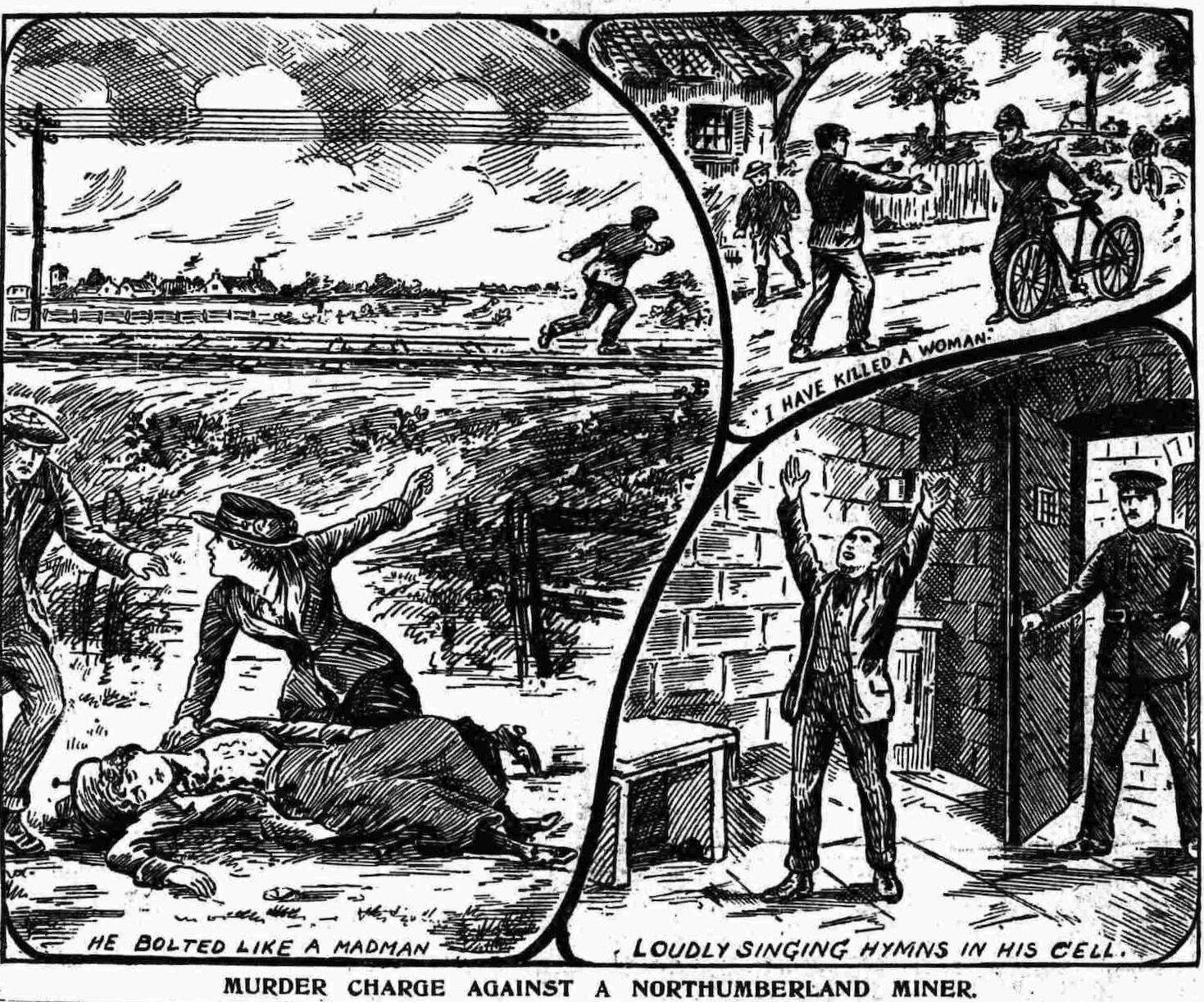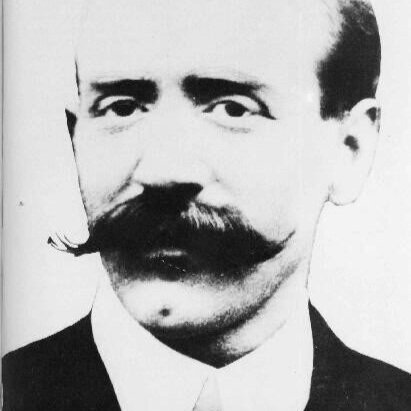
“If all goes well I hope to be with my own little Beccy in 6 or 7 weeks time, that is the only thing that makes me happy when I think about our meeting again.”
Scott’s Final Letters
When this project was launched in late 2020 a callout was made to members of the public asking for any memories they had of the gaol or any stories related to it. We were sent some remarkable stories, but perhaps most astonishing of all was the correspondence from Victoria Chilton. Victoria got in touch to say that she had a cache of letters, given to her by her grandfather, written by Ernest Bernard Scott.
Now, anyone who has done some digging on this website will know that Scott was one of the last two men executed at Newcastle Gaol. He was hanged for the brutal murder of Rebecca Jane Quinn near New Delaval in Blyth.
Reports from the trial noted that Scott and Quinn had possibly been seeing each other for three weeks and that Quinn had a young daughter, Mary, by another man. Rebecca’s child was to become key to the case. On the 11th August 1919, Scott called on Margaret Davidson (a friend of Rebecca’s) with a note for Rebecca saying that her baby had been scalded and that she was to come to her mother’s at once. Margaret delivered the note and Rebecca, understandably panicked, set off with Margaret to her mother’s as quickly as possible, but they were ambushed on route by Scott. Scott cut Rebecca’s throat and fled the scene, later giving himself up to a local policeman. It was a shocking and callous crime and caused great consternation in New Delaval and the surrounding areas.
Some of Scott’s letters played a key part in the initial inquest held at Blyth, as Margaret produced his note to her as evidence. Numerous reports of the inquest detailed that on seeing the letter Scott angrily declared that there was another part of the letter missing. The inquest did see another letter, but it was shown by a Mr Elijah Smith, of Bebside (a coal mining village to the west of Blyth). The papers reported that Quinn had at one time been in the Women’s Army Auxillary Corps (W.A.A.C) but now ‘kept house’ for Mr Smith. In the letter, received by Mr. Smith on the evening of the murder, Scott had written that he “cannot part with my love…in death we shall be happy.” On the letter being read out Scott angrily claimed that there was another letter he had sent to Smith, a claim which Smith vehemently denied.
During his incarceration and whilst awaiting trial and final sentencing numerous newspaper reports noted that Scott continued to write prolifically and sent many letters to friends and family, a number of whom visited him during his time in the gaol. Indeed, several were published in the local newspapers. The published letters give a fascinating insight into Scott’s preoccupations in his last few months on earth. Amongst these letters are a number in Victoria’s possession, the images of which have been generously sent to the project. There are five letters in total, the first of which was written on the 13th August (two days after the crime for which he was sentenced) and the last of which was penned on 3rd November, just two days before he was sentenced to death (5th November) and a little over three weeks before he was executed (26th November 1919). The letters were all written to family members, with one to his parents, another to his sister and brother and three solely for his sister.
The letters give a fascinating insight into his thoughts and preoccupations during his incarceration. The newspapers would often report that Scott was found “singing hymns” or “joking” in his cell and in a constant state of cheer, but the letters show that there were several things that were troubling him, one of which was care of Rebecca’s child. Writing to his brother on the 18th October Scott said,
“Never mind dear brother death only divides us for a while but memories never part. Soon your sailor brother will be in happiness and peace. Love the child for Beccy’s sake and mine. Don’t forget Jack my darling would have been your sister so take her child as your sister for my sake.”
Similarly in a letter to his sister, dated October 10th, Scott pleaded,
“Dear sister always go and see the child and let me know about her.”
In fact it would appear that his preoccupation with Rebecca’s child even caused his mother anguish. Writing to his sister on 26th October, Scott noted that
“Mother says in last letter I hurt her feelings when I said Mary would be my last thought. Dear sister have I not reasons to think and love the child I left without a tender mother’s care I don’t wish for any letters like that here it only makes me love Mary more.”

There is one Desire I have and that is my people together will get a good wreath for her grave…I pray to God that I won’t be long in stepping Jordan to meet her.
— Ernest Bernard Scott writing to his mother and father from prison.
Another thing that appeared to preoccupy his thoughts was Rebecca’s grave and making sure his family could pay their proper respects there. Writing on the 13th August to his parents (two days after the murder) he stated,
“There is one Desire I have and that is my people together will get a good Wreath for her grave. I wish you to understand when you put that on her grave you put it on mine also.
It is clear from other letters though that the Quinn’s, understandably, rejected his and his family’s intimations and any attempts by the family to visit. Writing to his sister on October 10th, Scott told her how he was going to write to Rebecca’s father
“about the objection he has with my peoples respects to Beccy. I am letting him know that my people are not responsible for what I have done. But understand none of my people must think any the worse of him for that. I gave him reasons against myself but not against any of you.”
Indeed, the newspapers noted that there were several attempts by Scott to contact Rebecca’s parents and even to try and get them to allow Mary to visit, but as one newspaper put it they had “refused to accept letters from Scott”.
Scott’s trial took place at the Northumberland Assizes on the 5th November 1919. Scott pleaded not guilty but refused representation by counsel and asked no questions of the numerous witnesses who gave evidence against him. The trial in its entirety was concluded in less than eighty minutes. Shortly before being sentenced to death he was asked if he had anything to say as to why the death sentence should not be passed. The Scotsman reported his reply as follows,
“Not in the least. I will get the happiness I want then. I have long looked for it, and was deprived of it. I will not be deprived of it in the next world. nothing at all. I shall get the happiness I want then.”
This final statement tallied with one he made in a letter to his sister weeks earlier, on October 10th,
“If all goes well I hope to be with my own little Beccy in 6 or 7 weeks time, that is ther (sic) only thing that makes me happy when I think about our meeting again. Well cheer up lass my happy day is coming bye and bye.”
Scott was executed at 8am on Wednesday 26th November 1919 and buried within the grounds of the prison. The letters kindly sent to the project can be viewed below.
